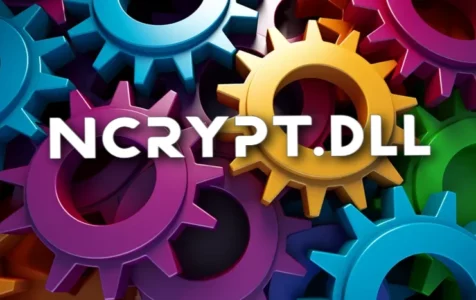Ncrypt.dll is a dynamic link library file that is a critical part of the Microsoft Windows Operating System. It is a module known as the Windows cryptographic library or Windows NCrypt Router and is developed by Microsoft Corporation. Located in the C:\Windows\System32 folder, this file plays a vital role in the encryption and decryption of data, ensuring that private information is securely handled within the operating system.
As with other DLL files, ncrypt.dll contains code, data, and resources used by multiple programs simultaneously, helping to conserve memory usage. It’s common to find this file in various sizes, with the most common instance being around 219,136 bytes on Windows operating systems like Windows 10, Windows 11, and Windows 7.
This file is not meant to be directly interacted with by end-users, and it does not come with a detailed description of its functions within the system. However, because it is a Microsoft signed file and embedded directly into the operating system, it is generally considered safe and trustworthy.
Can Ncrypt.dll Be a Virus or Malware?
It’s crucial to understand that legitimate DLL files like ncrypt.dll are often mimicked by malicious software. Therefore, while the original ncrypt.dll file is secure, its imitators can indeed be harmful. Hackers often name their malware with the names of genuine files to avoid detection. Thus, if you find ncrypt.dll outside of its standard location, you should be wary.
Expert Tip: For smoother PC performance, consider using a PC optimization tool. It handles junk files, incorrect settings, and harmful apps. Make sure it's right for your system, and always check the EULA and Privacy Policy.
Special offer. About Outbyte, uninstall instructions, EULA, Privacy Policy.
To confirm whether ncrypt.dll on your system is legitimate or a security threat, you might consider employing a security tool such as the Security Task Manager. This can offer insights into potentially nefarious processes masquerading as legitimate files.
Fixing Ncrypt.dll Related Issues
If you encounter issues related to the ncrypt.dll file, such as error messages stating that it is missing or corrupted, there are several steps you can take to remedy the situation. Here’s what you can do:
1. Scan for Viruses: Perform a thorough scan of your computer using your antivirus software to ensure that the error is not the result of a malicious file posing as ncrypt.dll.
2. System Restore: If the problem emerged after installing a particular program or making system changes, conducting a system restore to a point before these changes can often reverse any issues that have arisen.
3. SFC (System File Checker): Run the System File Checker tool to repair missing or corrupted system files. You can do this by typing “sfc /scannow” in the Command Prompt (admin).
4. DISM Tool: Deploy the Deployment Image Servicing and Management (DISM) tool if SFC was unable to fix the issue. Run “DISM.exe /Online /Cleanup-Image /RestoreHealth” in the Command Prompt (admin).
5. Reinstall the Program: If ncrypt.dll errors appear when using a specific program, reinstalling that software might replace the problematic file.
6. Manual Download: If all else fails, you may consider downloading the ncrypt.dll file from a reputable source and manually placing it in the appropriate directory. However, manual downloads should be a last resort due to the potential risks of downloading DLL files from the internet.
User Reviews and Community Discussions
The internet hosts various forums and discussions where users share their experiences with DLL files and the issues surrounding them. For instance, user discussions on sites offer insights from tech specialists and the broader community about problems related to DLLs, including ncrypt.dll. Gaining perspective from others who faced similar challenges can be very helpful.
Conclusion
Ncrypt.dll is an authentic Microsoft file that should not pose any problems when it is in its proper place, doing what it’s designed to do. Always approach DLL issues with caution, conduct periodical system scans, and try the remedies mentioned above when encountering errors. If these steps seem daunting or ineffective, seeking professional help from a tech specialist is advised to ensure your system’s integrity and security.
